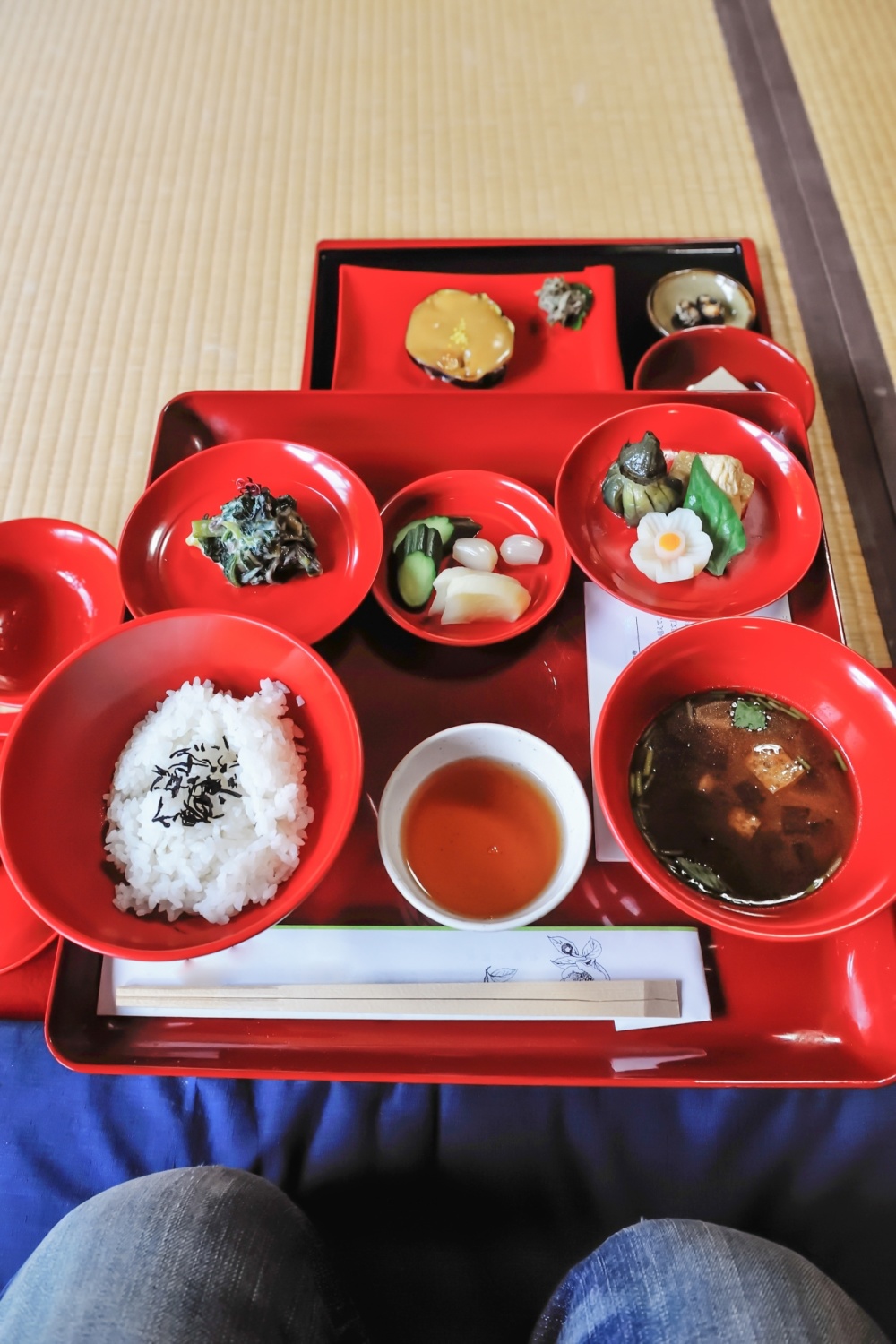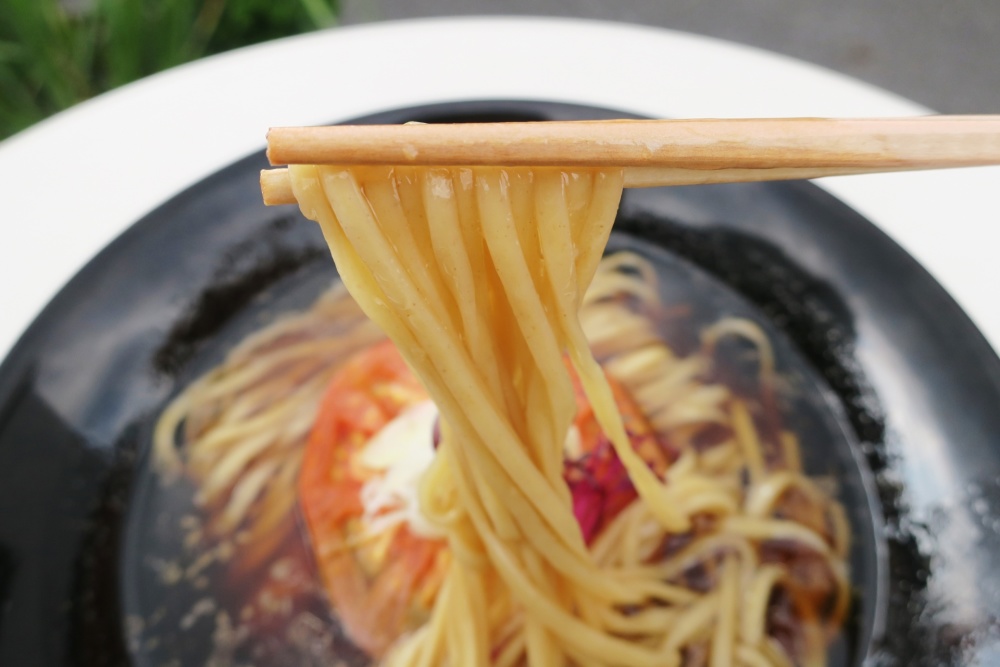Updated April 3, 2025
Vegan Food in Japan: A Guide [2025]
As a vegan, you might think that eating plant-based in Japan will be hard.
After all, the country has a very specific culinary culture. And that culture involves a variety of animal products, meats, and stock. However, this wasn’t always the case, as Japan has a history of vegetarianism and veganism, primarily influenced by Buddhist tradition.
So, with the prominence of veggies in Japanese cuisine and Tofu being a popular vegan protein source that’s served pretty much everywhere, eating vegan in Japan may be easier than one might think.
In this post, I’ll explore whether veganism is common here and what it’s like to live in Japan as a vegan. I’ll also share some great resources to help you find the best vegan food in Japan and recommend a few great vegan restaurants.
Let’s start by taking a look at the popularity of veganism in Japan.
In this article: 📝
Is Veganism Popular in Japan?
While veganism is not as popular here as it is in many Western countries, it has been gradually gaining popularity due to the global rise of veganism in the past couple of decades.
Today, there are many more vegan restaurants and cafes in Japan than before, especially in larger cities like Tokyo and Osaka. However, there are still some struggles that need to be addressed.
For one, until very recently, the distinction between vegan and vegetarian was almost nonexistent. Most people know what vegetarian food is, but if you go to Japan’s countryside (inaka), you may have to double-check that your food is vegan as promised.
This is because “vegetarian” is still used as an umbrella term for both diets in most parts of the country.
In Tokyo or Osaka, people are much more familiar with the term, and you’ll find food and restaurants specifically advertised as “vegan” are catching on. However, in most other places, you need to watch out for ingredients like bonito flakes or dashi made from fish, which are quite common in Japanese cooking. I’ll share my tips on ordering vegan food to avoid these below as well.
So, are Japanese not vegan-friendly? Why does vegetarianism get recognition while veganism gets lost in the mix?
Zen Buddhist Vegetarian Roots: Is Japan Vegan Friendly, Then?
It’s not that Japan is not vegan-friendly. It’s not that they favor vegetarianism, either. A big reason why vegetarianism seems to be well-known here is because Japan might simply more familiar with it.
As I explained in my post on New Year in Japan, where I featured a variety of traditional Japanese dishes served during the New Year, many dishes are naturally vegetarian or even vegan.
This is a common theme in Japanese cuisine because Japan actually has vegetarian roots as a country.
When Zen Buddhism arrived in Japan, it influenced the Emperor at the time to convert to Zen Buddhism. Following this, he quickly banned eating meat across the empire and even banned hunting and killing animals.
Of course, the purpose was to stop animal suffering and cruelty and live a pure life divorced from the agony of all living beings. This went on for about 100 years, and over time, people have become accustomed to a fully vegetarian diet.
Essentially, this is why so many traditional Japanese dishes are vegan and vegetarian.
Today, you can still experience Zen Buddhist food at temples in Japan. So, let me introduce you to some of the naturally vegan Japanese dishes and food items, and I’ll also explain Buddhist food in more detail.
Vegan Food in Japan: Vegan Japanese Cuisine
As I mentioned, Japanese cuisine isn’t just about meat and animal products – the country’s cooking culture is actually quite accommodating to vegans, with lots of veggies and plant-based protein sources available.
So, most of the vegan food options you’ll come across in Japan are taken right from Japanese cuisine. These dishes are either made vegan by substituting meat for Tofu or are naturally vegan due to not containing any ingredients sourced from animals.
So, let’s explore vegan Japanese cuisine first and see which vegan dishes are the most popular here. These are, essentially, your easy-to-find options, and are accessible at most Japanese restaurants, so listen up!
Vegan Sushi Japan
As you might know, “Sushi” is commonly known as the bite-sized food that’s served with vinegar-seasoned rice and various toppings, so it doesn’t necessarily have to include fish or seafood.
In Japan, where sushi is omnipresent, you’ll find many classic and experimental sushi dishes exclusively prepared using vegan ingredients. The best part is that they aren’t necessarily “labeled” as vegan or vegetarian because these dishes are traditionally prepared without any animal products.
For instance, cucumbers, fermented soybeans (natto), or pickled veggies like radishes are great vegan sushi toppings.
In addition to regular sushi, Inarizushi, which is made with deep-fried tofu, is another vegan option commonly served in many restaurants across Japan.
Vegan Ramen Options
Ramen is a noodle soup dish that’s traditionally made with various rich broths, meats, and vegetables. However, like sushi, ramen itself isn’t inherently non-vegan.
For one, most ramen noodles normally don’t contain eggs, so the noodles themselves are risk-free. Although it doesn’t hurt to ask before you order, and be mindful of the topping options too.
I’ll admit that finding vegan ramen may be tougher than vegan sushi, but there is a wide range of options in bigger cities like Tokyo. For instance, the best vegan ramen in Tokyo is served by the Michelin-star awarded Uzu Ramen, which is famous for its tomato, miso, and onion-based ramen dishes.
Buddhist Temple Food: Shojin Ryori

I mentioned that the food served at Buddhist temples in Japan is vegan, and these dishes are collectively called Shojin Ryori.
Now, this isn’t something you’ll come across when you’re out and about, but if you get to visit a Buddhist temple or stay at a temple lodge (Shukubo), you can experience Shojin Ryori.
The only thing to be mindful of is the use of dairy in some temples, so it’s best to ask in advance to be sure.
Shojin Ryori doesn’t just look appealing but also tastes amazing. You’ll eat mountain veggies, tofu, and herbs prepared sustainably with principles of zero waste, and the meals are pretty light as well.
Other Japanese Vegan Food Options Readily Available
Mentioning every single vegan Japanese dish is an impossible task, but we can still name some of the most notable vegan foods in Japan you can eat with peace of mind.
For instance, Onigiri is another rice-based food that can also be vegan. These rice balls that sometimes come with filling can be packed with pickled veggies and are staple konbini and supermarket items. As some of the most popular ready-made foods in Japan, finding plant-based ones should be easy.
In addition, you can also eat Natto to your heart’s content. These sticky fermented soybeans are packed with protein and umami-rich in flavor, but I should warn you that the distinct texture and smell may not be for everyone.
Tempura is another popular dish that can be easily made vegan, but ensure the batter doesn’t contain eggs. These are essentially deep-fried bites covered in batter, and you can easily find veggie ones.
Lastly, many cold and hot soba and udon dishes can also be vegan/vegetarian. If you’re worried about the broth, go for Zaru soba, which are cold noodles eaten with fresh veggies, pickles, and soy sauce instead of broth.
Non-Japanese Vegan Food in Japan
As I said, Japan already has a “vegetarian history,” so finding vegan dishes and plant-based substitutes in Japanese cuisine is somewhat easy.
That said, looking for non-Japanese food in Japan is a harder task, especially in the countryside or smaller cities where vegan restaurants and cafes serving Western vegan food are scarce.
I’ll share my resources for finding vegan restaurants near you below, but a restaurant may not always be an option. Luckily, you’ll still be able to find many vegan options in convenience stores.
Of course, you may have better luck if you’re in Tokyo, Osaka, Fukuoka, or any other large city in Japan. In recent years, many vegan Western restaurants and cafes have been popping up in the urban areas of Japan, and this trend seems to be growing.
Today, you’ll see more and more restaurants with vegan labels and stickers issued by the Japan Vegan Society. The certification isn’t just handed to anyone, so you can rest assured when dining at such places.

Vegan Tokyo Recommendations: Best Vegan Restaurants in Tokyo
If you’re in Tokyo, you’re in luck. While the less populated areas of Japan may be hard to navigate as a vegan, this metropolis has tons to offer in terms of vegan sushi, ramen, and all kinds of other classic Japanese dishes you can imagine.
For starters, how about a hot bowl of vegan ramen? I know the best place.
Best Vegan Ramen in Tokyo: Uzu Ramen, Ippudo Plant-Based Studio
I mentioned that Uzu Ramen makes the best vegan ramen in Tokyo, which wasn’t an overstatement. This Michelin Guide-listed ramen place is actually an experience.
Located in teamLab Planets in Toyosu, a modern art museum known for its cutting-edge installations, the place serves a miso ramen dish that’s beautifully creamy, decadent, and filled with seasonal vegetables. After a nice, hot bowl, you can cool off with Uzu’s vegan ice cream flavors too.
If you aren’t able to visit Uzu Ramen, I’ve got another “best of Tokyo” for you. A more classic ramen restaurant, Ippudo Plant Based Studio is the vegan location of the restaurant chain.
The plant-based studio is tucked away inside the Lumine department store in Shinjuku. The best-selling item on the menu is undoubtedly the Tonkotsu-inspired white ramen, and a spicy red version was recently added that instantly became a favorite.
Vegan Restaurants in Tokyo: Vegan Katsu, Soba, and Curry
The abovementioned places are great for vegan ramen, but Japanese cuisine is so much more than that.
If you’re in the mood for some good soba, curry, or katsu dishes made vegan, Saido just may be the answer. This place prepares dishes with mushrooms and vegetables, and everything is vegan. Located in Meguro-ku, Saido’s menu is extensive, even covering vegan sake and desserts, and is definitely worth a visit.
If you’re looking for a snack or a lighter meal, Yu Cafe’s vegan gyozas might do the trick. If you’re around Taito-ku, Vegan Gyoza Yu Cafe is a must-visit. This cafe offers plenty of other delicious vegan snacks and drinks, along with a nice patio for sitting outside in the summer.
Lastly, another great vegan restaurant in Tokyo is Fucha Bon, which serves authentic Buddhist vegetarian food in a restaurant setting. Also located in Taito-ku, you can go for one of the bento boxes, which don’t disappoint, but they have a variety of other options, too.
Vegan Japanese Cuisine in Osaka: Our Restaurant Recommendations

We’ve talked about the bustling tech scene in Osaka before, so it shouldn’t be a surprise to find so many vegan options here as well. The city has lots of tourists and foreign residents, which helps vegan places thrive, so you have plenty of great options.
For starters, you have a great vegan ramen spot in the Chuo Ward, called Alohana Vegan Ramen. What makes this place unique is its Hawaiian-Japanese fusion theme, so you’re sure to get something delicious and different.
Something a bit more classically Japanese can be found in Yodogawa-ku. Brown Rice Sushi TEC is a sushi restaurant serving all-vegan dishes. In addition to sushi, you’ll find fried vegetable and tofu dishes here as well, and takeout is possible.
Last but not least, a slightly more modern approach to Japanese cuisine comes from Genmai Cafe, where they serve all-vegan macrobiotic food. The best option is their lunch sets, which include soups and riceballs. The place is located on the second floor, close to Hommachi, in the Chuo ward.
Vegan Japanese Restaurants in Kyoto: Top Vegan Restaurants
The old capital of Japan is another great city with plenty of vegan restaurant options.
Starting with the best vegan ramen in town, you want to check out Uzu Ramen’s Kyoto location. This experimental approach to serving ramen offers an authentic yet innovative way to enjoy Japanese ramen made vegan.
If you’re not in the mood for something so specific, Mumokuteki Vegan Cafe has a wider range of dishes available, all vegan, of course. Both Uzu Ramen and Muokuteki Cafe are located in Nakagyo ward.
If you’re in the Kita ward, however, Ikuri is a must-visit for all vegans. This modern cafe offers a fusion menu that blends traditional Japanese with Western vegan food, which isn’t easy to come by here.
Lastly, if you’re looking for vegan sushi, you have Da Maede & Lapis in the Kamigyo ward, but make sure to reserve a table a few days in advance, as this is quite the trendy spot for all vegans folks residing in Kyoto.
Resources For Vegans: How To Find Vegan Food in Japan On Your Own
While we conclude this vegan guide to Japan, let me share some resources that’ll help you find vegan food on your own.
For one, you always have the Happy Cow app at your disposal, which shows all the vegan restaurants and cafes all over Japan, including reviews, menus, images from people who’ve been there, etc.
Finding ingredients to cook vegan food at home is even easier. Thanks to the prominence of vegetables and alternative protein sources like tofu in Japanese culture, you’ll find lots of good quality produce in supermarkets.
This fondness for healthy eating has also made its way into snack foods in Japan, so finding something vegan to eat should always be easy. At every konbini and supermarket, you’ll find lots of veggie, seaweed, and rice-based snacks of all kinds, which should always keep you full when you’re out and about.
If you’re in doubt, Is It Vegan Japan is a handy website to check if something you bought is vegan.
Other than these, Facebook groups like Vegan Japan are great resources for finding all things vegan here. If you find yourself struggling when eating out, I also suggest carrying a card with you that includes all of your dietary restrictions in Japanese, which you can show when ordering at any restuarant.
As long as you remember our tips, you’ll be golden. While this is it for vegan food in Japan, if you want more on Japan’s food culture, check out my guide to Japanese noodle types.
Get Job Alerts
Sign up for our newsletter to get hand-picked tech jobs in Japan – straight to your inbox.









